#which is supposed to symbolize that he's the professor's son no matter which timeline he's in
Explore tagged Tumblr posts
Text

a timeline out of reach
#hi today it's arven angst time :')#fun fact: each of the professors have their own respective books but Arven's book only shows the back cover#which is supposed to symbolize that he's the professor's son no matter which timeline he's in#also the red and purple mix together on Arven because /composition/#arven#arven pokemon#professor sada#professor turo#pokemon scarlet and violet#pokemon sv#plati painty pride
456 notes
·
View notes
Text
Plot
The central conflict of this book relates to Zoey’s mother’s death and the mystery of Aurox. It’s stated multiple times that a powerful sacrifice would be needed to create a creature like him, and Linda was murdered not long before he first showed up at school. Therefore, Zoey and co. are pretty sure Neferet is behind Linda’s murder, but they need to find a way to prove it.
However, as is often the case with this series, very little time is actually spent working toward this goal, or even really discussing it. I mean, absolutely nothing is done about Aurox until the very end, and Zoey has a very easy way to figure out what he is. Her seer stone heats up every time she sees him, so, logically, she just needs to look through it to see what kind of old magick was used in creating him. But that would hugely advance a major plot point faster than the author wants, so of course it doesn’t happen.
Instead, we have a weird half-conflict with Zoey and Stark because Kalona invading Stark’s dreams is making him sleep deprived and grumpy, but this is ended unceremoniously and nothing actually comes of it. We have Stevie Rae and Rephaim regularly arguing about a) him longing to reconnect with his father, and b) her wanting him to stay with her when he turns into a bird. Again, nothing really comes of this. We have the Twins’ falling out, which comes out of nowhere, is way-overemphasized considering how little presence they’ve had in the last several books, and – oh yeah – accomplishes nothing.
There are other, scattered little conflicts, too, like Lenobia and Travis’ romance subplot that takes up far too much room in this book considering how little reason I have to care about it, or the rogue red fledglings showing up at school, or Rephaim and Dallas butting heads over Stevie Rae, etc.
Rather than all these different conflicts making the book feel complicated, or creating the impression that the characters are overwhelmed, all this does is distract from the one conflict that actually matters. Because nothing really comes out of these other conflicts, they essentially amount to padding and filler. It’s only there because the author wanted the book to be longer than 50 pages.
Day One: Chapter 2 – Chapter 12 (Thursday) I’m starting at chapter two because the prologue and chapter one were technically the day before, but aren’t super important to the timeline of the book, particularly as it pertains to the ritual at the end. Basically, in those chapters, we learn that Kalona is still influencing Stark through his dreams but Zoey doesn’t actually do anything about it, and we learn a little bit about what Aurox is and is capable of.
We start with ableism and too much dialogue before Zoey and co. load onto the minibus to head to school, there’s some conversation about grief between her and Damien, and then we start the school day. Zoey, Stevie Rae, Kramisha, Erik, Dragon, Lenobia, and Neferet have a Skype meeting with Duantia. This goes on far too long and basically confirms that, yes, they can treat the tunnels as a separate dorm from the Tulsa House of Night, but Neferet is still their High Priestess – except no, she’s not, at least not for red fledglings, because Stevie Rae is their High Priestess despite not actually running a school or having any valid reason to hold that level of power.
Scattered throughout is a chapter with Kalona and a chapter with Rephaim. Kalona is upset about Rephaim turning from him and orders some of the other Raven Mockers to go ask Rephaim to spy for him. Rephaim, meanwhile, is dealing with bullying and jealousy from Dallas. Damien is showing him around to classes, and they quickly decide that he should sit out his fourth hour fencing class because Dragon would not be happy to see him. While Rephaim is hanging out in a courtyard, his brothers show up.
Now, this is where the timeline gets screwy, because Zoey and Stevie Rae leave the Council Meeting at the beginning of second hour, but somehow they hear the fight that breaks out when Dragon sees Rephaim talking with Raven Mockers. There’s a confrontation, Neferet shows up with Aurox, who transforms and kills one of the Raven Mockers, and Stevie Rae uses her affinity to protect Rephaim without ever actually manipulating the earth because Wasted Potential is this series’ true name. They all argue ineffectually for a while about why Rephaim was speaking with Raven Mockers and what the hell Aurox is, including Zoey feeling her seer stone heat up but failing to even try to look through it.
We then get a single, tedious chapter from Erik’s perspective. He’s a Tracker. He Tracks and Marks Shaylin. She’s blind, but then she’s not because vampyrism. Also, she’s Marked red and that’s concerning. She confuses Erik by talking about auras. The end.
Back with Zoey in the stables, Lenobia reassures her that it’s totally fine to not look at Aurox through the seer stone because that makes her uncomfortable. Also, Stark being briefly possessed is definitely not worth worrying about. Then we meet Travis, the new human stablehand that Neferet has hired for Lenobia. There is much tittering about how hot he is, though the author very confusingly insists on comparing him to Sam Elliott. There is tension between him and Lenobia, but she decides to be courteous to him to thwart Neferet’s dastardly plan of creating mild confusion and irritation – sorry, I mean “chaos”.
Damien shows up to tell Zoey that her Grandma is there and looks like she’s been crying. We get confirmation that Zoey’s mom has been murdered. For some reason, the police assume it was drug addicts looking for quick money, despite the body being entirely drained of blood. After completely mistranslating a bunch of Cherokee words, they agree to perform a cleansing ritual at Grandma’s farm once she has completed her own seven days of mourning.
There’s a scene with Aurox and Zoey. He randomly has Kleenex because he is Heath and ~*symbolism*~. Zoey’s emotions stay with him, which is weird.
Zoey meets Shaylin, who reveals she can see auras in the most confusing way possible. Damien concludes this is probably True Sight, and almost immediately after their introduction, Neferet shows up. Shaylin pretends to faint. There’s some arguing, but because Shaylin is Marked red, she goes to the tunnels with Zoey and co. instead of staying at the school under Neferet’s sway. After Neferet leaves, Shaylin basically says her aura looks like pure evil.
(This is also about where we derail into an infuriating and unnecessary rant about the author’s – sorry, Aphrodite’s – right to say ableist slurs.)
We cut to Kalona. He learns that Rephaim is human now and Aurox killed one of his sons. He decides to seek out Rephaim in the interest of working against Neferet, their common enemy.
We cut to Rephaim. He and Stevie Rae argue because she wants him to stay with her when he turns into a bird, but he says being a raven makes him a dangerous beast. Sure. Right. Also, Stevie Rae tries to convince him to stop holding out hope for his father because he’s a bad parent.
Zoey and co. talk about True Sight. And then they argue about if they can still trust Rephaim after seeing him talking with Raven Mockers. Nothing comes of any of this. They all go to bed.
We have a pointless chapter with Lenobia and Travis.
We then cut to Aurox. He and Neferet go into the basement of Will Rogers High School in a needlessly complicated and drawn out scene. They find the rogue red fledglings and convince them to come back to the House of Night, largely because they’ll all die if they aren’t around adult vampyres – never mind that Dallas is an adult and there aren’t that many of them.
Day Two: Chapter 13 - Chapter 16 (Friday) Stark has a dream about Zoey dying. The narration makes it seem like it’s not from Nyx, but nothing comes of it, so… I have no clue what it was supposed to accomplish.
They arrive at the school. The bus full of rogue red fledglings is already there. Requisite but pointless drama. Then, as everyone is heading into the school, Rephaim pulls Zoey aside and tells her he can feel Kalona calling to him. They go meet with Kalona, talk for far too long to basically conclude that he wants a truce so he can help them defeat Neferet.
Zoey skips class because she’s stressed, then spends several pages recapping events to herself. She has another conversation with Aurox, which is interrupted by Stark. She tries to talk to Stark about Aurox, but then they’re interrupted by Thanatos, who tells them that she has a new class for special students that will take over her first hour slot, effectively saving Zoey from ever attending class with Neferet as her professor. Can’t have Zoey dealing with discomfort!
They eat lunch and talk about daddy issues. This is where we learn that, suddenly, Shaunee also has a tumultuous relationship with her father. We thus start the Twins’ conflict.
There’s a short and pointless scene with Lenobia in the stables.
Back at the tunnels, Kramisha reveals her new poem. They speculate about what it means for a while but ultimately come to no useful conclusions. They once again argue about if Rephaim can be trusted, which – again – leads to no meaningful changes or developments. Aphrodite makes a rude comment when Rephaim leaves to go turn into a bird, and Stevie Rae runs out of the room crying. Zoey goes to comfort her. Then Zoey goes to be and uses spirit to calm Stark’s dreams.
Kalona is watching Stark’s dream, which is cringey and pointless, but seems to be the last time Kalona ever uses this connection to Stark in this way.
Day Three: Chapter 17 (Saturday) Shaunee refuses to go shopping with Kramisha, Aphrodite, and Erin on the excuse that she is sick, which causes tension between her and Erin. Shaunee reflects on feeling neglected and abandoned by her father. Kalona shows up and they talk. Shaunee is sympathetic to his efforts to reconnect with Rephaim, so she gives him her cell phone.
We then cut to Shaunee telling the group about this. Tensions boil over between her and Erin. They officially have a falling out.
Day Four: Chapter 18 (Sunday) While Zoey and Aphrodite are sitting outside the depot chatting about recent events, Thanatos shows up. She waxes poetic about train stations for a needlessly long time. Then she announces that she’s buying the depot in their name (even though Duantia had already declared the High Council was going to do this), and then explains that she wants to uncover the truth about Neferet, which is further cemented when Zoey says she believes Neferet has taken the white bull as her Consort.
We have a scene where Aurox attempts to rape Becca and is only stopped by Dragon showing up. Dragon tells Becca to stop freaking out and walk away gracefully if she’s not interested. Aurox and Dragon talk, and Aurox says Zoey isn’t mean like Becca.
Day Five: Chapter 19 – Chapter 24 (Monday) Zoey and co. attend their first class with Thanatos. Nothing really happens except that Thanatos threatens bodily harm against Dallas, not because he’s a bigot, but because he’s a bigot in her classroom. Everyone writes down questions they would like to have answered and Zoey shows complete and utter disregard for her friends’ privacy by trying to peek at them.
After class, Dallas and Rephaim have a confrontation in the hallway. Or possibly the courtyard. The scene can’t make up its mind. Dragon breaks up the fight, but still doesn’t like Rephaim, so there’s a bunch of yelling and arguing about that. The chapter ends with Thanatos, Zoey, and Stark talking about their fear that Dragon might turn over to Darkness.
We have a chapter with Lenobia. She and Travis are still flirting and I still don’t care. They kiss, then she rejects him and runs away to cry in her room. I still don’t care.
Over with Neferet, she narrates about all the “chaos” she is causing and is very smug about it. Then she sees Zoey and Shaunee talking outside. She tries to call on Darkness to break a tree branch and kill Zoey, but Darkness – which killed Jack and Shekinah without additional sacrifice – refuses to kill Zoey because she’s a High Priestess and demands a powerful sacrifice. So Neferet asks Darkness to break the tree and bruise Zoey. Aurox rushing in to save her is written off as the white bull interceding for Reasons.
We get the same incident from Zoey’s perspective. Aurox gives off the same heat as the seer stone because… sure?
Zoey skips class again and runs into Thanatos, who asks her if she will talk about her mother’s death in front of an entire class of her peers. Thanatos also asks for Grandma’s phone number so she can talk to her about Linda’s death. Oh, and apparently Thanatos can see Darkness and Light, but has kept this a complete secret because apparently it won’t accomplish anything because the High Council is uselss. Also, Zoey is now being compared to Frodo.
On the bus home, everyone discusses whether or not the wind felt unnatural that day, and then Aphrodite has a vision. Too much time is spent discussing ordering pizza as a distraction. Finally, we get to Aphrodite in her room after the vision, which is followed by her rehashing the vision in a completely disjointed, poorly prioritized, and way too dragged out fashion. The conclusion is that Rephaim cannot attend the cleansing ritual at Grandma’s farm or he’ll die. Naturally, Stevie Rae and Rephaim show up to say that no, actually, Rephaim will still be attending that ritual, because logic and survival is for chumps.
Neferet and the bull spy on Kalona and conclude that his attachment to Rephaim is a big weakness.
Stevie Rae and Rephaim discuss the same BS about Kalona again, but also argue about him attending the ritual. They conclude that he is, in fact, still going to the ritual, and also Stevie Rae says she will stop pestering him about how his dad is evil and he should stop trying to repair their relationship.
We get the scene Neferet witnessed, but from Kalona’s perspective. He realizes Neferet is watching him. Concerned for Rephaim, he flies to the depot, where he sees Rephaim transform into a bird and gets mad at Nyx for still punishing Rephaim despite supposedly forgiving him.
Day Six: Chapter 25 - Chapter 29 (Tuesday) Zoey talks to the special class about her mom’s death, which includes digressions into Islamophobia and gay stereotypes. Then Thanatos announces – in front of the entire class, including Aurox – that Zoey and co. will be helping her perform a ritual to reveal who killed Zoey’s mother at her Grandma’s farm and that they leave right after class. Naturally, Aurox goes and tells Neferet, who tells him to follow them and interfere so that the ritual can’t be completed (but not to kill a High Priestess, because we can’t have actual threats or tension for the main character). Dragon also finds out what they’re doing because he sees everyone heading in the same direction despite having different classes, and also because Thanatos cannot understand the concept of “don’t tell Dragon because he might be the one who murders Rephaim.”
We spend a very long time on exposition and set up for the ritual, including heavy emphasis on how important it is that it be performed on the fifth night – which is unfortunate, since this is canonically the sixth night in the timeline. There’s also some serious research failure regarding Grandma’s dress, and for some reason Grandma is representing spirit in this ritual despite not having an affinity for it. Everything in the ritual is going fine until – shock horror – Aurox shows up! Because Thanatos announced their plans in front of him. Darkness has forced him to take on his bull form, he charges Rephaim, but Dragon shows up and defends Rephaim, completely countering literally everything that was built up about his motivations and regrets thus far.
They complete the ritual, witness Linda’s death, but can’t close the circle because Thanatos left out one very small detail: The ritual needs a death sacrifice to be ended. ‘Cause, you know, that’s not an incredibly sinister or disturbing thing to avoid telling a bunch of kids until the last minute.
But this story is built on convenience and contrivance, so Dragon is killed by Aurox, ending the ritual while allowing our main characters to survive and keep a clean conscience. Zoey finally looks at Aurox through the seer stone, realizes he’s Heath, and uses earth (sorry, a “green glow”) to prevent Darius and Stark from killing him. Aurox runs off. Everyone sees Dragon’s spirit reunite with Anastasia. Yay, happiness.
But Rephaim is badly injured. Kalona, who Stevie Rae had called on her cell phone during the climax, has shown up and is distraught that Rephaim is dying. So he cries and tells Rephaim he loves him, asking Nyx to spare him. One or all of these things – it’s not clear – heal Rephaim.
Thanatos declares she is the new High Priestess of Tulsa, ‘cause I guess she can do that and doesn’t, like, have responsibilities she needs to get back to in Italy. For unknown reasons, Kalona swears a Warrior’s Oath to her and says he will be the school’s new Sword Master.
8 notes
·
View notes
Text
Now There’s No Doubt Meghan and Harry Had to Leave
Caught between a hate-filled media and a terrified royal family, the surprise is not that the couple struck out on their own. It’s that they didn’t escape much sooner
Harry says racism ‘large part’ of reason why couple left UK
Shola Mos-Shogbamimu: Meghan has been mistreated for years
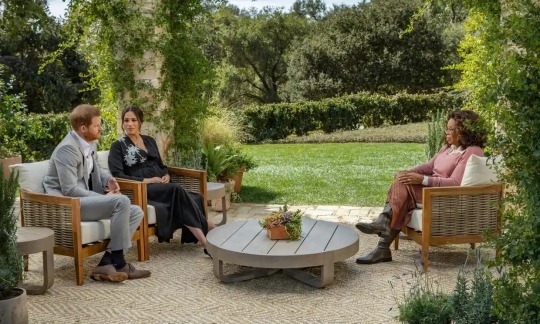
Prince Harry and Meghan, Duchess of Sussex, speaking to Oprah Winfrey on US television. Photograph: Joe Pugliese/Harpo Productions/PA
seldom remembered fact about the royal family is that, before the death of Princess Diana, it was not normal to be interested in them. Tabloids were fascinated, but it was more of a convention than news – like a splash about tomatoes causing cancer, it was the out-of-office auto reply of the industry, a fallback. The family (I seriously dislike the affectation of calling them “the Firm”) survived while there was nothing to see. They were caught between two irreconcilable forces – their own culture of discretion, on one side, and intense, 24-hour scrutiny on the other – and they navigated that with a studied blandness. What did they actually care about? Manners, duty, causes, the Commonwealth. Whatever curiosity surrounded them, they simply did not reward it, and the regular response to that, after a few centuries and whatnot, was to not be terribly curious.
You may recall David Blaine, the magician who lived in a glass box above the Thames for 44 days in 2003: people really wanted to know what he was doing, even though we could see what he was doing – and that was mainly nothing. There grew a peculiar resentment of gawping at something that was only interesting because it was untouchable. But we could see for ourselves that it was not interesting – and then everyone got annoyed and some of us (not me) threw eggs. Eventually, hawkers started selling eggs. That pretty much sums up the experience of the royals pre-1997.
The death of Diana changed all that, but in a counterintuitive way. Curiosity had driven a woman into a pillar, so you might expect a generalised reflection on the nature of it – what were the paparazzi hoping to see? A divorcee, going about her business, with a gentleman caller. Was there not a case for just giving it all a rest, especially given that the core traits of royalty, the bits that made them so unusual – restraint, self-abnegation, respectability – had been more or less torched by Prince Charles’s generation, anyway (it wasn’t just Camilla and Fergie and their antics; Prince Andrew, who, of course, was then still just a buffoon with no Jeffrey Epstein taint, had added to it with It’s a Knockout).
Instead, the opposite happened: far from posing difficult questions about whether all this invasive scrutiny was warranted or humane, the tragedy seemed to elevate it, to usher in a belief that this obsessiveness between a society and its head of state and her offspring and in-laws was somehow natural. The post-rationalisation of Diana and her place in culture is almost hallucinatory at times.
If you are of a certain age, you might recall that before she died, we were not all trying to dress like her. She was not our people’s princess; we may have watched Martin Bashir’s Panorama interview but with an idle rather than passionate interest. She was neither a feminist nor any other kind of icon. Fair play, it was a decent thing, when she held hands with HIV patients, but generally speaking, she was just a Sloane in an egalitarian age, a pretty relic. Her death should have sparked a conversation not just about an intrusive press but about what the family represented, whether its hierarchies and rules could survive any more contact with living, sentient modern souls.
Instead, it catalysed quite a cunning, self-justifying switcheroo from the gutter press: we had to hound the woman because the public demands it, the public is just so interested. This buried a landmine that has detonated a quarter of a century later, upon contact with that other fixation of the same media, race: or, more specifically, dog-whistling racist tropes.
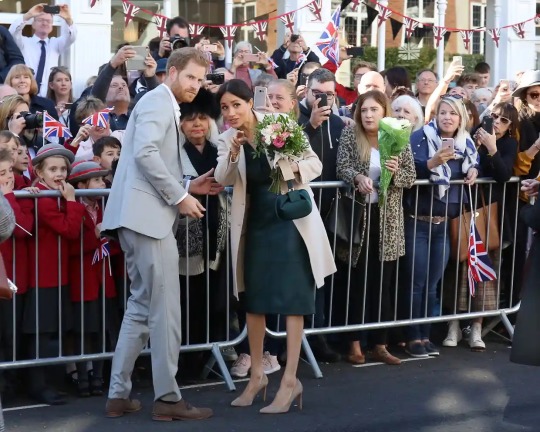
Harry and Meghan in 2018. Photograph: Neil Mockford/GC Images
And so we come to last night’s interview. It’s possible, of course, in any clash between two factions, for everyone to be in the wrong. It’s possible, for instance, for the royal family to be inhumane, hierarchical to the point of lunacy, snobbish and racist – and simultaneously for Prince Harry and Meghan to be spoilt and high-handed. On the eve of the Oprah interview with the couple, which aired on CBS on Monday at 1am GMT, it was indeed fair to expect that the impartial viewer would come away thinking: “Six of one, half a dozen of the other.” For those who were already Team Windsor, there were aspects that would grate enough to confirm their views: Oprah’s faux toughness, the mad opulence of the garden backdrop, the very carefully choreographed frankness. But in the end what swung it so far the other way certainly wasn’t the cute gender-reveal (the couple are expecting a girl). Instead, it was something much darker: Meghan’s disclosure that she “didn’t want to be alive any more” at one point, while pregnant with their first child, Archie. “That was a very clear and real and frightening, constant thought,” she said.
When I spoke to Katie Nicholl, royal reporter and the author of Harry and Meghan: Life, Love and Loss, before the broadcast, she had said, judiciously: “I think she perhaps didn’t give it long enough. Within 18 months they were off – that was no time at all. Fergie and Diana both gave it longer than that.”
That made sense when we spoke: what’s 18 months to get used to your in-laws? It’s the blink of an eye. But making the briefest survey of the kind of coverage Meghan received, the vehemence and double standards are breathtaking. It also goes some way towards explaining why she couldn’t just give it another year: the press seemed to be whipping itself into a frenzy; every negative story generated 10 more. If she ate an avocado, she was “wolfing down a fruit linked to water shortages, illegal deforestation and all-round general environmental devastation”. If she used lily of the valley in her bridesmaid’s flowers, she was potentially risking the lives of tiny children. She was portrayed as having bullied Kate, Duchess of Cambridge, to the point of tears over flower girl dresses for the wedding (the opposite was true, she told Oprah, God knows what was the root of all that) and routinely disregarded the Queen. And before very long, she was in despair. So you have to wonder, what is a reasonable amount of despair for a person to live with, and to what purpose? When were the smears ever likely to end? Do you have to be Californian and touchy-feely to ask whether that intensity of hatred is worth it, just to have people who will open your curtains and run you a bath?
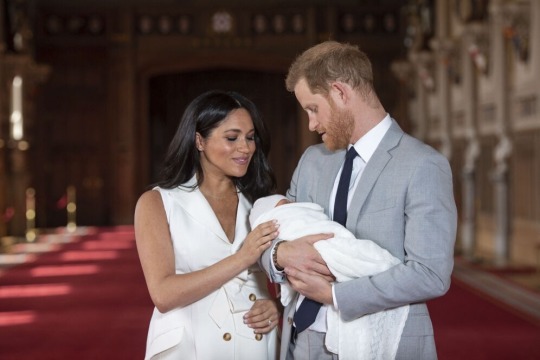
Harry put it surprisingly strongly, when he said he’s “acutely aware of where my family stand and how acutely scared they are of the tabloids turning on them”. In this he gave the kindest possible reading of the situation, not a family closing ranks against its own, but one cowering in terror and simply not strong enough to protect itself. Whatever the truth of that, the individuals and their possible shortcomings are less interesting than the central question, which is not why Meghan and Harry left, but why any of them stay.
Certainly, the most shocking part of Oprah’s interview were the revelations that Harry was asked by unnamed members of his family how dark his first child’s skin was likely to be – and that, whether relatedly or not, they discovered that Archie would not have a title or, accordingly, any security. So. Many. Questions. Not least, how was Harry supposed to make a guess at his unborn son’s skin colour? But panning out to the general vilification of Meghan, the she-said-he-said mysteries that remain become more or less irrelevant. Irrespective of which earrings she wore and who she got on with or didn’t in the royal household, it was impossible to ignore from the start of the couple’s relationship that she had become the cipher for racial slurs that were, in general terms, unsayable.
Kehinde Andrews, professor of Black studies at Birmingham City University, traces the timeline: when they first met, the Daily Mail imagineered a “satirical” scene in which the Queen meets Meghan’s mother, who’s “straight outta Compton” living in a “gang-scarred home”. Upon the occasion of their marriage – another revelation of the interview is that they actually married three days before that ceremony; I’m not sure how important that is in the grand scheme of things – there was an outpouring of colour-blind celebration. That “just showed how little understanding we have of racism,” Andrews says, “if you think that Meghan Markle would make any difference at all. The monarchy is probably the primary symbol of white supremacy in the world; the idea that one black woman could make a difference to that is just facile.” He compares her fall from grace to that of Barack Obama, “the early celebration, racism’s over, which then switches to: ‘This isn’t about race, this is about you being problematic.’”
When you look at the build up of negative press, it was focused on Meghan as aggressive, bullying and angry, with a secondary motif of her being inauthentic and devious and having hoodwinked Harry, who is typically portrayed as the hapless idiot in what has unfolded. “No one’s called her a racial slur,” Andrews says, “but you can see the stereotypes, she’s basically being treated like most black people in elite white institutions.” She doesn’t belong there, so she must have used cunning to get there, and naturally she wouldn’t know how to behave once she arrived.
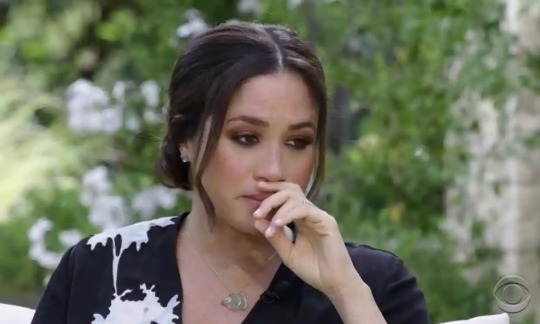
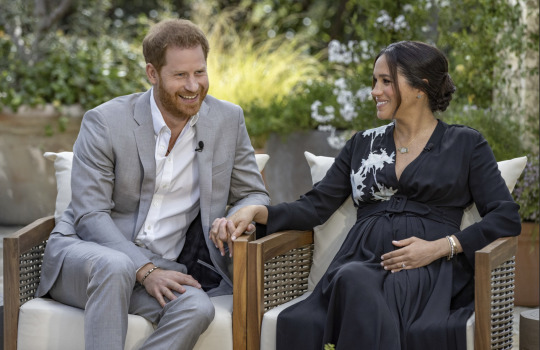
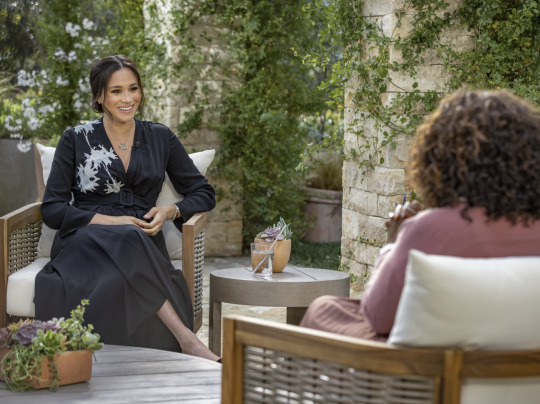
Let’s not pretend rich people don’t also kill themselves or experience depression’ ... Meghan during her interview with Oprah Winfrey on Sunday. Photograph: CBS
Here the idea that her predicament was in any way similar to Diana’s or Fergie’s comes apart. Yes, it would be a difficult adaptation for anyone, to suddenly be subject to protocols in which their individuality counted for nothing and all that mattered was the birth order of their spouse. But there was a particular timbre to the coverage of Meghan, that she was matter out of place – and what you’re dealing with there is not so much a hierarchy as a caste system.

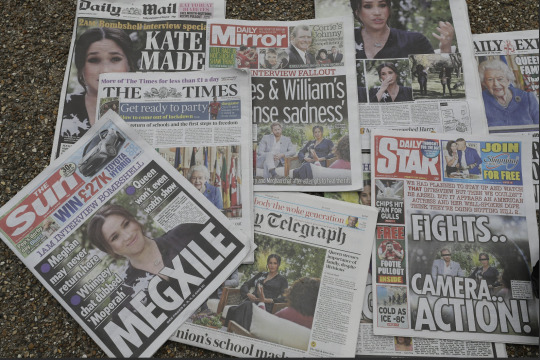
In the end, Prince Charles probably emerges worst from the interview, with Harry’s disclosure that his father stopped taking his calls. Prince William comes off relatively unscathed; the Queen, likewise. The damage done to the institution is that one person leaving breaks the spell, and you wonder why, if they are all “trapped”, as Harry says, they can’t just … change. But the hangover from the affair is the tenacious media vindictiveness that, once it finds its target, doesn’t seem able to let go. We accept it as a caper, a game, but the despair it causes is real.
— The Guardian USA | Zoe Williams @zoesqwilliams | Monday, March 8, 2021
1 note
·
View note